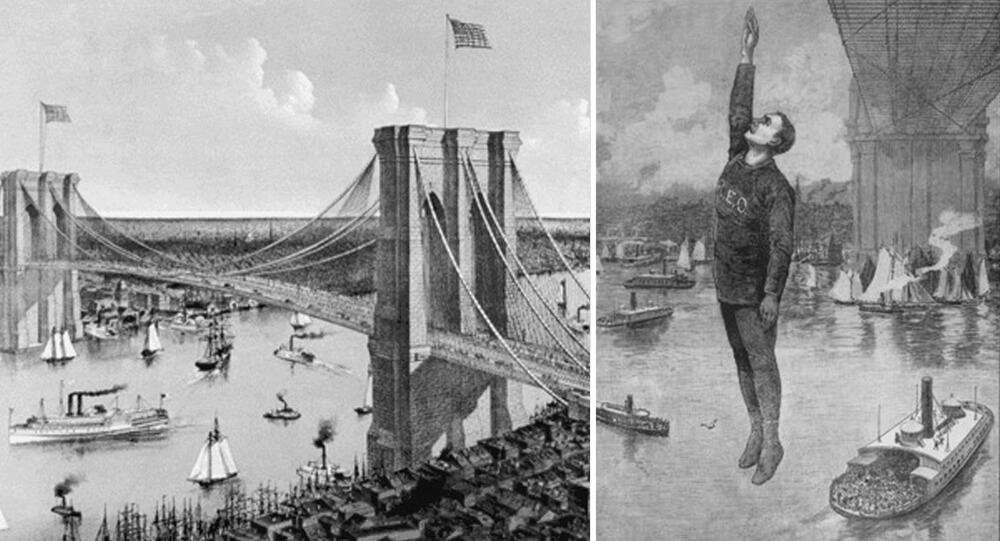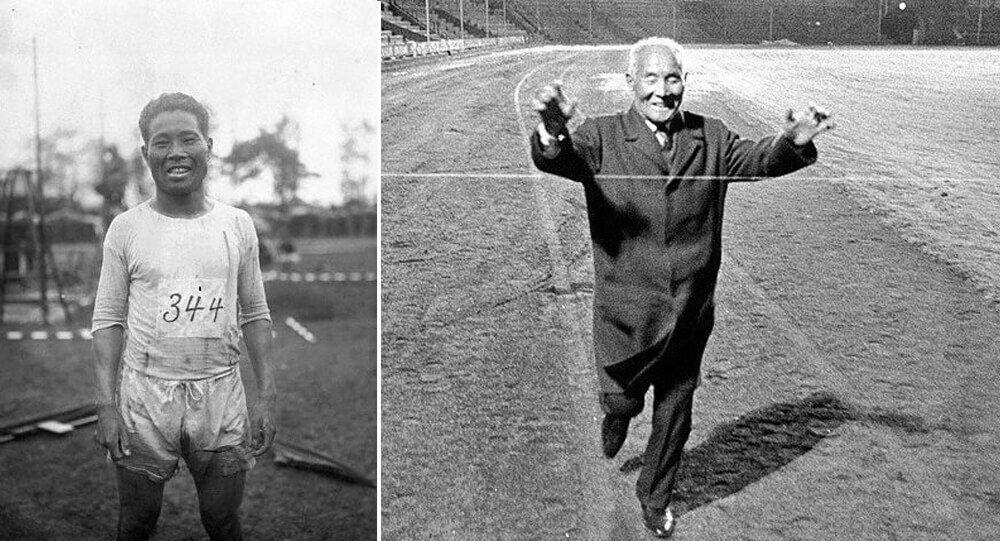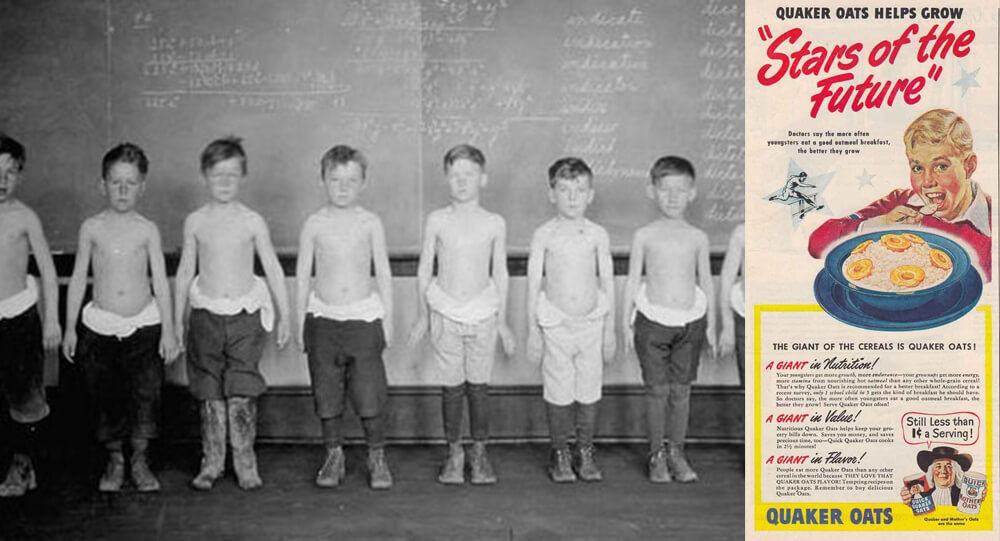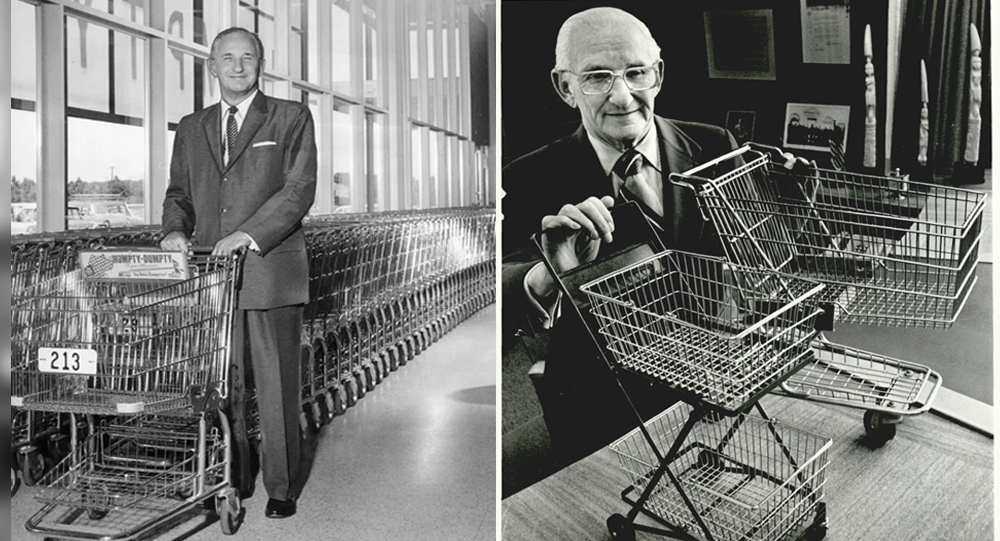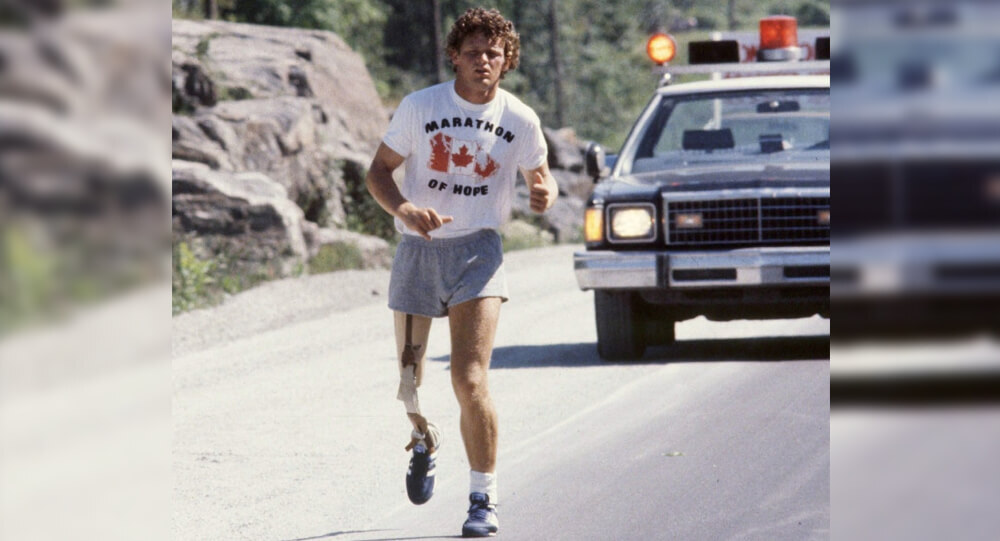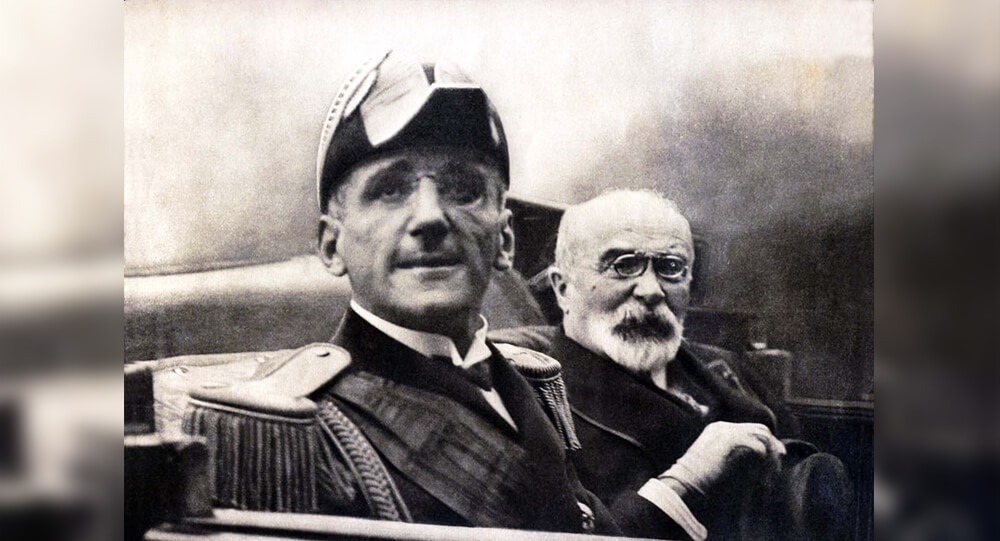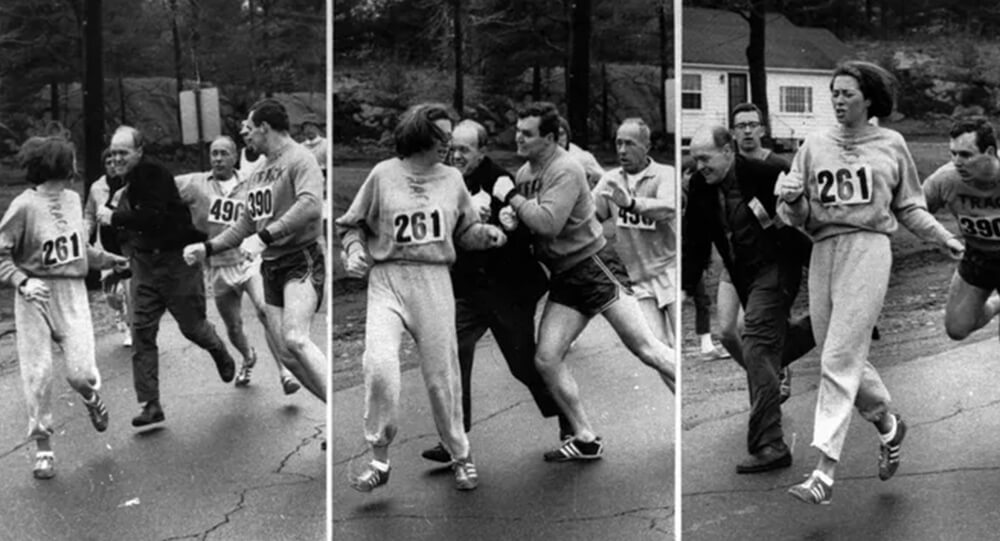
Kathrine Switzer was attacked by a race official 1.5 miles into her first Boston Marathon. Women didn’t compete in marathons in 1967. At least not formally.
Running up behind Switzer, the race official yelled and grabbed her sweatshirt. He was making an attempt to remove her race number-adorned bib.
“The race director attacked me simply because I was a woman and because I was wearing a bib number,” Switzer told Humankind. “He was angry because he was an overworked race director, and frankly, he was a product of his time.”
Switzer attended Syracuse University as a student. She had been jogging since elementary school, but there were no women’s sports at her institution.
Switzer recalls, “I went and asked the track coach if I could run on the men’s track team.” He responded, “No, I don’t believe so. Switzer accepted the invitation to train with the squad, saying, “That’s against NCAA rules, but we’d welcome you to come work out with us.”
Arnie Briggs, a volunteer coach, was 50 years old. He was a former marathon runner as well as Syracuse’s mailman. He took me under his wing and gave me daily advice on how to run farther and not stress about running quickly, according to Switzer.
Briggs talked to them about running the Boston Marathon as they were moving along.
He responded, “No woman can run a marathon!” when Switzer told him she planned to participate as well.

Even though she was stunned, Switzer persisted. She was promised by Briggs that he would be the first to take her to Boston if she could demonstrate to him in training that she could complete the 26.2 miles. Switzer eventually far outran the 26.2 miles in practice, thus the wager was accepted.
No woman had ever officially registered for or participated in the Boston Marathon before 1967. Switzer examined the marathon’s regulations. She registered as KV Switzer with no regard for gender.
For a very long time, Switzer recalls, “I’ve been signing my name with my initials.” “My loving father misspelled my name on my birth certificate. I signed my name that way since I wasn’t trying to deceive them.
Switzer lined up with hundreds of other guys at the 1967 Boston Marathon’s starting line while donning bib #261 and a coat of lipstick. Soon after the starting pistol had fired, Jock Semple, the race official, pursued her.
This brief incident changed the course of women’s running forever. Switzer was inspired by the incident and started advocating for women’s sports equality.
Women were finally permitted entry to the Boston Marathon five years after her encounter with Semple. On that momentous day, Switzer was at the starting line.
She continued to run marathons, winning the 1974 New York City Marathon. In 1975, she ran her personal best and came in second in Boston (2:51:37). After that, she established the Avon International Running Circuit, a series of 27 races for women only. Over a million women have participated since 1978.
The International Olympic Committee decided to incorporate a women’s marathon for the first time in the 1984 Olympic Games thanks in large part, according to Switzer, to the momentum women’s running gained due to her efforts.
According to Switzer, “sometimes the worst things in your life might turn out to be the best.”
One of the most astonishing social revolutions for women was brought about by old Jock Semple, who no one could have ever dreamed could have done it.
The Boston Athletic Association formally retired Switzer’s bib number 261 in 2017, but not before the number had a life of its own. With the goal of inspiring women to connect and take charge of their lives through running, Switzer founded the international non-profit organization 261 Fearless.
Switzer’s decision to participate in the 2017 Boston Marathon coincided with the retirement of her historic bib number.
When I turned 70 and it was the 50th anniversary of my 1967 marathon, Switzer remarked, “I found myself approaching those milestones with the belief that I could run it again.”
Only 20 minutes later than when she was 20 years old, she completed the task.
Switzer added, “I crossed the finish line with the feeling that we have altered history. “In fifty years we have gone from one woman wearing a bib to twelve thousand women wearing a bib here on the streets of Boston.”
“I felt like I had successfully carried a torch to the millions of women who have had their lives changed by running throughout the world,” the runner said.

Robert Odlum, the first person to jump off the Brooklyn Bridge
The first person to jump off the Brooklyn Bridge was a professional high diver who "wanted to demonstrate that people did not die simply by falling through the air, thus encouraging people to be willing to jump from a burning building into a net." He proved himself correct by safely falling 135 feet through the air and dying only when he hit the water.

Reason Behind The Suicide Of Christine Chubbuck Live On Air
Actor Rebecca Hall had serious reservations about tackling the macabre story around why Chubbuck killed herself in 1974. So what changed her mind?

Will & William Wests: The puzzling situation of two inmates who are identical but not related
These are the mugshots of Will West and William West, and they are not related. They were both sent to Leavenworth Prison at the same time, in 1903, and after some confusion, the staff understood they had two different prisoners with the nearly same name, who looked exactly alike. They are part of the reason fingerprints are now used as identification.

Charlie Brown and Franz Stigler incident: Enemy became friends
During WWII, a German pilot spotted an American pilot’s crippled plane in the sky. Tailing it, he noticed that gunner was dead, crew injured, and they posed no threat. Instead of destroying the plane, he led it to safety. 40 years later, the two pilots reunited.

Shizo Kanakuri’s 1912 Olympic Marathon Finished 54 Years
At the 1912 Olympics, a marathon runner quit and went home to Japan without telling officials and was considered a missing person in Sweden for 50 years. In 1966, he was invited to complete the marathon. His time: 54 years, 8 months, 6 days, 5 hours, 32 minutes, and 20.379 seconds.

The unbroken seal on King Tutankhamun's tomb until 1922
The unbroken seal of Tutankhamun's tomb before it was opened in 1923, it was unbroken for over 3000 years.

Nathan's Famous Doctor Stunt
When Nathan's Famous Hot Dogs first opened in 1916, the owner hired people to dress as doctors and eat hot dogs outside his shop, to convince people his hot dogs were healthy.

How European Rabbits Took over Australia
In 1859, wealthy settler Thomas Austin released 13 wild rabbits on his Australian estate. By 1920, their population grew to 10 billion.

Quaker Oats Fed Children with Radioactive Oatmeal
In the 1940s and 1950s, Quaker Oats and MIT conducted experiments on radioactive iron and calcium-containing cereal. The diet was part of a study to see if the nutrients in Quaker oatmeal traveled throughout the body. In January 1998, a $1.85 million settlement was reached for 30 victims who came forward.

Jack the Baboon operated a railroad, earned a living, and never made a mistake
A baboon worked as a signalman for the railroad in the late 1800s. He never made a mistake and worked for the railroad until the day he died.

D.B. Cooper: Man who hijacked a plane and jumped out with a $200,000
On November 22, 1971, DB Cooper hijacked a Boeing 727, drank a whisky, smoked a fag, and then jumped out of the plane with $200,000. He was never again seen.

Sylvan Goldman: The Visionary Who Revolutionized Shopping with the Cart
The inventor of shopping carts, Sylvan Goldman, had to hire several male and female models to push carts around in his store, demonstrate their utility, and explain their use to other customers, due to not catching on initially.

Top 10 most cruel medical procedures that are being used today
We are all aware that medicine has advanced dramatically over the last fifty years. There are several modern medical approaches available today, but this was not always the case. However, the past of medicine is a dark one. Medical leeches, lobotomy, vascular surgery, cranial stenosis, and even electroshock therapy are all options. These are only a couple of the cruel healing techniques that are still in use today.

Albert Einstein’s brain after it was stolen from his body
Albert Einstein's brain was taken by the opportunistic pathologist who performed his autopsy hours after he died and kept in two jars for 30 years. The stolen brain of Albert Einstein was preserved in a cookie jar for 30 years until being discovered by a journalist.

The true story of Annie Oakley, legendary sharpshooter
Anne Oakley was such a good shooter that she could split a playing card help edge-on, hit dimes thrown into the air, shoot cigarette from her husband's lips, and pierce a playing card thrown into the air before it hit the ground.

How Cleveland's Balloonfest in 1986 Turned Into a Public Tragedy
In Cleveland, Ohio, United Way broke the world record by deflating nearly 1.5 million balloons as part of a publicity stunt to raise money. The balloon obstructed a US Coast Guard search for two boaters who were subsequently discovered to have drowned, blocked airport runways, and blocked land and waterways.

June and Jennifer Gibbons The silent twin who Only Spoke to Each Other
Identical twins June and Jennifer Gibbons were born on 11 April 1963 at a military hospital in Aden, Yemen where their father worked as part of the Royal Air Force.

Why was the Eiffel Tower almost demolished
The Eiffel Tower was intended to be a temporary structure for the World's Fair in 1889, but it was nearly dismantled and sold for scrap metal. It was saved because of its potential use as a radio antenna, and it now serves as a tourist attraction as well as a working broadcast tower.

Nordlingen, The Town Inside A Meteorite Crater With Millions Of Meteorite Diamonds
The German town of Nördlingen is embedded with 72,000 tons of microscopic diamonds. About 15 million years ago, a meteorite hit this region, and the impact created a massive depression and formed rocks containing diamonds, glass, and crystals. The town was built in the impact crater sometime around 898 CE.

The 440-pound bear named Wojtek and his World War II battle against the Nazis
Polish troops raised an orphaned bear cub during WWII. He enjoyed drinking beer, and was trained to salute. He became officially enlisted as a member of the forces, and helped carry artillery during battle.

Terry Fox, a 21-year-old one-legged cancer patient who ran 143 days before dying
Terry Fox was a 21-year-old one-legged cancer patient who ran 3,339 miles across Canada in 143 days before dying.

Roller Coasters were First Invented to Distract People from sin
Roller coasters were invented to distract Americans from sin. In the 1880s, hosiery businessman LaMarcus Thompson didn’t like that Americans were going to places like saloons and brothels and created the first roller coaster on Coney Island to persuade them to go there instead.

The Assassination Of King Alexander
The assassination of King Alexander of Yugoslavia marked a pivotal moment in the country's history. This article delves into the rise and reign of King Alexander, exploring his early life and ascension to the throne. It also examines the political and social climate in interwar Yugoslavia, setting the stage for the tensions and challenges that ultimately culminated in his tragic assassination. By understanding the context in which this event unfolded, we can better grasp the significance and impact it had on the nation and its future.

Nicholas Winton ‘British Schindler’: Man who rescued 669 Czech children from Nazis
A man named Nicholas Winton saved 669 kids during WWII and lived almost all his life without letting people know.

Did Gil Pérez Really Teleport from Manila to Mexico Overnight? The 1593 Mystery
On October 24, 1593, while performing his guard duties at Manila's Governor's Palace in the Philippines, Gil Perez stopped to lean against a wall and sleep for a while. He opened his eyes to find himself in an unusual environment. Gil was in the Plaza Mayor in Mexico City. They imprisoned Perez, but the authorities in Mexico City decided to release him and return him home.

